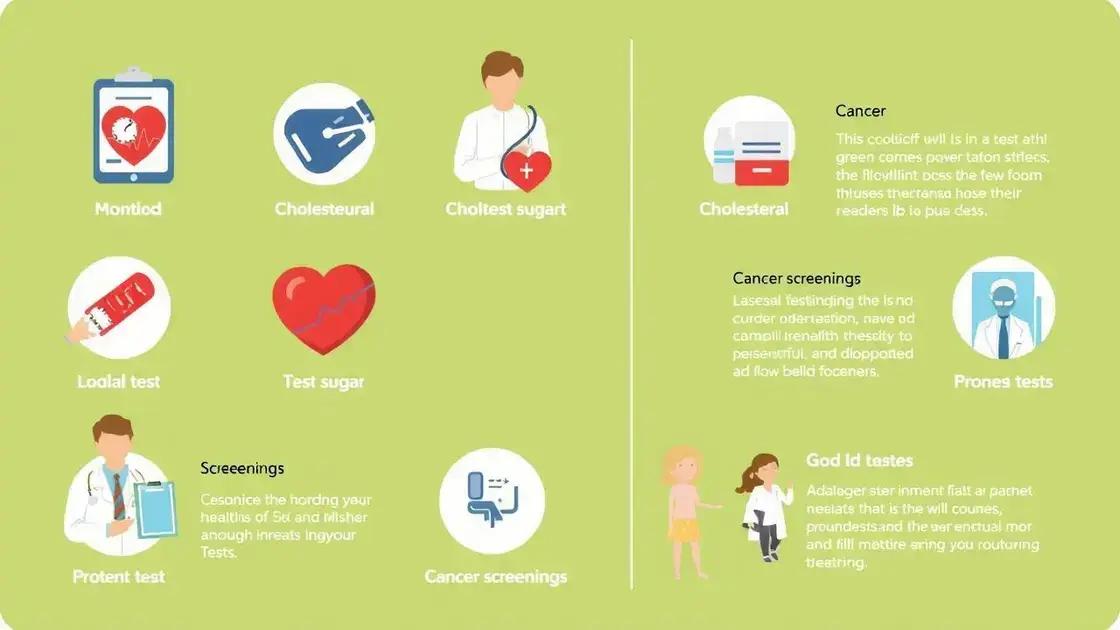Regular health screenings are essential for early detection and prevention of health issues. Common tests like blood pressure checks, cholesterol tests, and cancer screenings provide valuable insights, enabling timely medical intervention. Preparing for screenings by reviewing medical history and following instructions enhances accuracy and peace of mind. Prioritize your health through regular screenings to ensure long-term well-being.
Regular health screenings are vital in the prevention of illnesses and maintaining overall well-being. These check-ups help identify potential health issues before they become serious, empowering individuals to take charge of their health. By understanding the importance of regular health screenings, individuals can make informed decisions about their health. In this article, we will explore various types of health screenings, their benefits, and how to prepare for them.
Understanding Health Screenings

Health screenings are routine tests performed to detect potential health issues before they become serious problems. These screenings can help identify diseases early when they are easier to treat. They play a significant role in preventive healthcare.
What Are Health Screenings?
Health screenings include a variety of tests and examinations such as blood pressure checks, cholesterol tests, cancer screenings, and more. They provide essential data about an individual’s health status. Understanding what screenings are available is the first step in taking charge of your health.
Why Are They Important?
Regular health screenings are important because they can catch conditions like hypertension, diabetes, and certain types of cancer early. This early detection can lead to better treatment options and is crucial for maintaining long-term health.
Who Should Get Screened?
Everyone should consider regular health screenings, but the specific tests and frequency can vary depending on age, gender, and risk factors. For example, women may need specific screenings for breast and cervical cancers, while men might focus on prostate screenings.
How Often Should Screenings Be Done?
The frequency of health screenings depends on individual needs but generally aligns with specific guidelines based on age and other risk factors. It’s essential to consult with a healthcare provider to establish a personalized screening schedule.
Key Benefits of Regular Screenings

Regular screenings provide numerous benefits that contribute significantly to overall health and well-being. They are essential tools in preventive healthcare, helping individuals stay informed about their health status.
Early Detection
One of the primary benefits of regular screenings is early detection of diseases. When health issues are identified early, treatment options tend to be more effective. This can lead to better outcomes and even save lives.
Monitoring Health Changes
Regular screenings help individuals monitor any changes in their health over time. This ongoing awareness can alert people to potential problems before they become serious, allowing for timely medical intervention.
Reducing Healthcare Costs
By detecting health issues early, regular screenings can ultimately help reduce healthcare costs. Treating conditions at an early stage is often less expensive than treating advanced diseases. This can lead to significant savings in medical expenses.
Peace of Mind
Knowing your health status can provide peace of mind. Regular screenings can reassure individuals that they are healthy or help them take proactive steps if issues are detected. This mental comfort is vital for overall well-being.
Common Tests and Their Importance

Health screenings include various tests that are crucial for maintaining health. Understanding these common tests can help individuals prioritize their preventive healthcare.
Blood Pressure Monitoring
Blood pressure checks are essential for identifying hypertension, which can lead to serious complications like heart disease and stroke. Regular monitoring helps track changes and manage heart health effectively.
Cholesterol Tests
Cholesterol tests measure levels of LDL (bad) and HDL (good) cholesterol. High LDL levels can increase the risk of heart attacks and strokes. Knowing your cholesterol levels enables you to make dietary and lifestyle changes to improve heart health.
Blood Sugar Tests
A blood sugar test is important for detecting diabetes or prediabetes. Early detection can help prevent severe complications associated with uncontrolled blood sugar levels, including heart disease and kidney failure.
Cancer Screenings
Cancer screenings, such as mammograms and colonoscopies, are vital for early detection. Finding cancer early often leads to better treatment outcomes. Discuss with your healthcare provider which screenings are appropriate for you based on your age and risk factors.
How to Prepare for a Health Screening

Preparing for a health screening is key to ensuring accurate results. Here are some tips on how to prepare effectively.
Know Your Schedule
Before your appointment, ensure you know the date and time. Mark it on your calendar and set reminders so you won’t forget.
Review Your Medical History
Reviewing your medical history can help the healthcare provider understand your health better. Bring any relevant documents, such as past test results or medication lists.
Follow Pre-Screening Instructions
Your healthcare provider may give you specific instructions before the screening. This can include fasting for certain blood tests or avoiding specific medications. Always follow these directions carefully.
Wear Comfortable Clothing
On the day of the screening, wear comfortable clothing that allows easy access for the tests. For example, if you’re getting a blood pressure or cholesterol test, short sleeves may be preferable.
Stay Calm and Relaxed
Being anxious can affect your screening results. Try to stay calm and relaxed before your appointment. Engaging in deep breathing or listening to music may help ease your nerves.
In Summary: Ensuring Your Health Through Regular Screenings
Regular health screenings are essential for prevention and early detection of potential health issues. They empower individuals to take charge of their health and make informed decisions.
Understanding the common tests and their importance, along with the key benefits of regular screenings, sets a strong foundation for better health management. Preparing adequately for these screenings enhances the likelihood of accurate results and a smooth process.
By prioritizing regular health screenings, you are investing in your long-term well-being. Don’t wait – make your health a priority today!
FAQ – Frequently Asked Questions About Health Screenings
Why are regular health screenings important?
Regular health screenings are crucial for early detection of potential health issues, allowing for timely treatment and better health outcomes.
What common tests should I expect during health screenings?
Common tests include blood pressure monitoring, cholesterol tests, blood sugar tests, and various cancer screenings, each providing valuable health insights.
How often should I get screened?
The frequency of screenings depends on your age, gender, and specific health risks. Consult with your healthcare provider to develop a personalized schedule.
What should I do to prepare for my health screening?
Prepare by reviewing your medical history, following any pre-screening instructions, wearing comfortable clothing, and staying calm before the appointment.
What happens if a health issue is detected during a screening?
If a health issue is detected, your healthcare provider will discuss further testing or treatment options to address the concern.
Can health screenings help reduce healthcare costs?
Yes, by detecting health issues early, regular screenings can lead to less expensive treatment options, potentially reducing overall healthcare costs.













